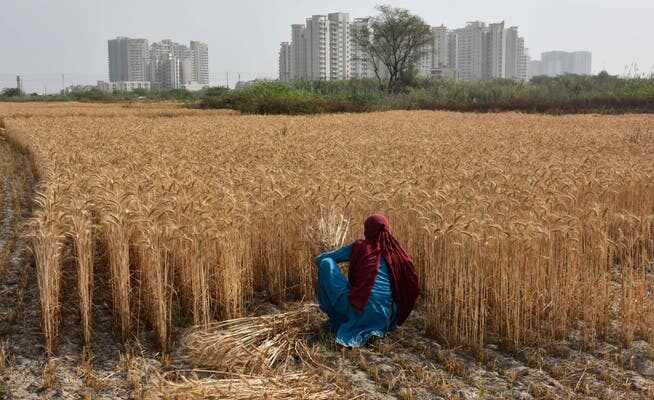Because of the Ukraine war, the global supply of wheat is threatened. After a good harvest, India promised to come to the aid of particularly affected countries. Instead, Delhi has now largely halted exports.
GURUGRAM, INDIA – APRIL 14: Farmers harvest wheat crop on the occasion of Baisakhi at a village on April 14, 2022 in the outskirts of Gurugram, India. (Photo by Vipin Kumar/Hindustan Times via Getty Images)
Indian Prime Minister Narendra Modi had actually promised the world wheat. As recently as April, India wanted to help fight the global hunger crisis looming over the war in Ukraine. The war has created global supply shortages, with Russia and Ukraine typically accounting for a quarter of world wheat exports. But then India suddenly banned the export of wheat. Only after international criticism has it now partially revised the decision.
A confusing back and forth has arisen around Indian wheat. As late as April, Modi said: “We are ready to send help tomorrow.” The Indian farmers had harvested enough, it was enough for India and for the world. In fact, the numbers seemed to agree with Modi. Because during twelve months India had exported more wheat than ever before: 7 million tons, that was more than twice as much as in the previous year. This year it should be 10 million tons.
Second largest wheat producer
India is the second largest wheat producer in the world after China, with Indian farmers harvesting around 100 million tons a year. However, most of the harvest is needed to feed the population of almost 1.4 billion people. After deadly famines in the last century, India attaches great importance to food security – the state stores tons of grain.
Last weekend, India suddenly announced an export ban for wheat. You need the harvest yourself – it was obviously leaner than expected. This also has something to do with the heat wave in South Asia: temperatures rose very early in the year and reached highs in the breadbaskets of northern India. Much wheat has apparently come in.
The sudden halt to exports meant that the price of wheat skyrocketed. Up to 4,000 trucks loaded with wheat were jammed at a port in the state of Gujarat. Foreign diplomats criticized the turnaround. The US ambassador to the UN said she hopes India will reconsider the restrictions: “We encourage countries not to restrict their exports because all restrictions exacerbate food shortages.” German Agriculture Minister Cem Özdemir also criticized India’s decision.
Failed vaccine diplomacy
The situation was strongly reminiscent of India’s turnaround on corona vaccinations. India tried its hand at vaccination diplomacy during the pandemic: after the first wave of Covid, the country had the number of cases under control and produced large quantities of the Astra Zeneca vaccine. India gave away vaccine to neighboring countries, its vaccinations were firmly planned in the global vaccination program Covax. When a second, fatal Covid wave raged in India, the country stopped all vaccine exports – you now need the doses yourself.
The story is also similar because the world was dazzled by the impressive numbers both times: no country produces more vaccine than India, only one country produces more wheat. But a large part of the production has to meet local demand. It would therefore be more helpful to look at the export figures. India was according to the World Bank In 2019 only the seventh largest vaccine exporter and exported fewer doses than Italy. When it comes to wheat exports, India doesn’t even make the top ten.
Prime Minister Modi is never at a loss for a big announcement – such promises can be exploited months later in the election campaign. Its officials then have to take care of realpolitik.
After the complete ban on exports, India decided on some exceptions this week. Export contracts agreed before the stop are fulfilled. New exports must be explicitly permitted by the government in Delhi. The latter has announced that it will continue to export to countries that need the wheat to ensure their food security. In addition, an older agreement with Egypt, the world’s largest wheat importer, is to be respected despite the export ban: Egypt had ordered 500,000 tons of wheat from India.
